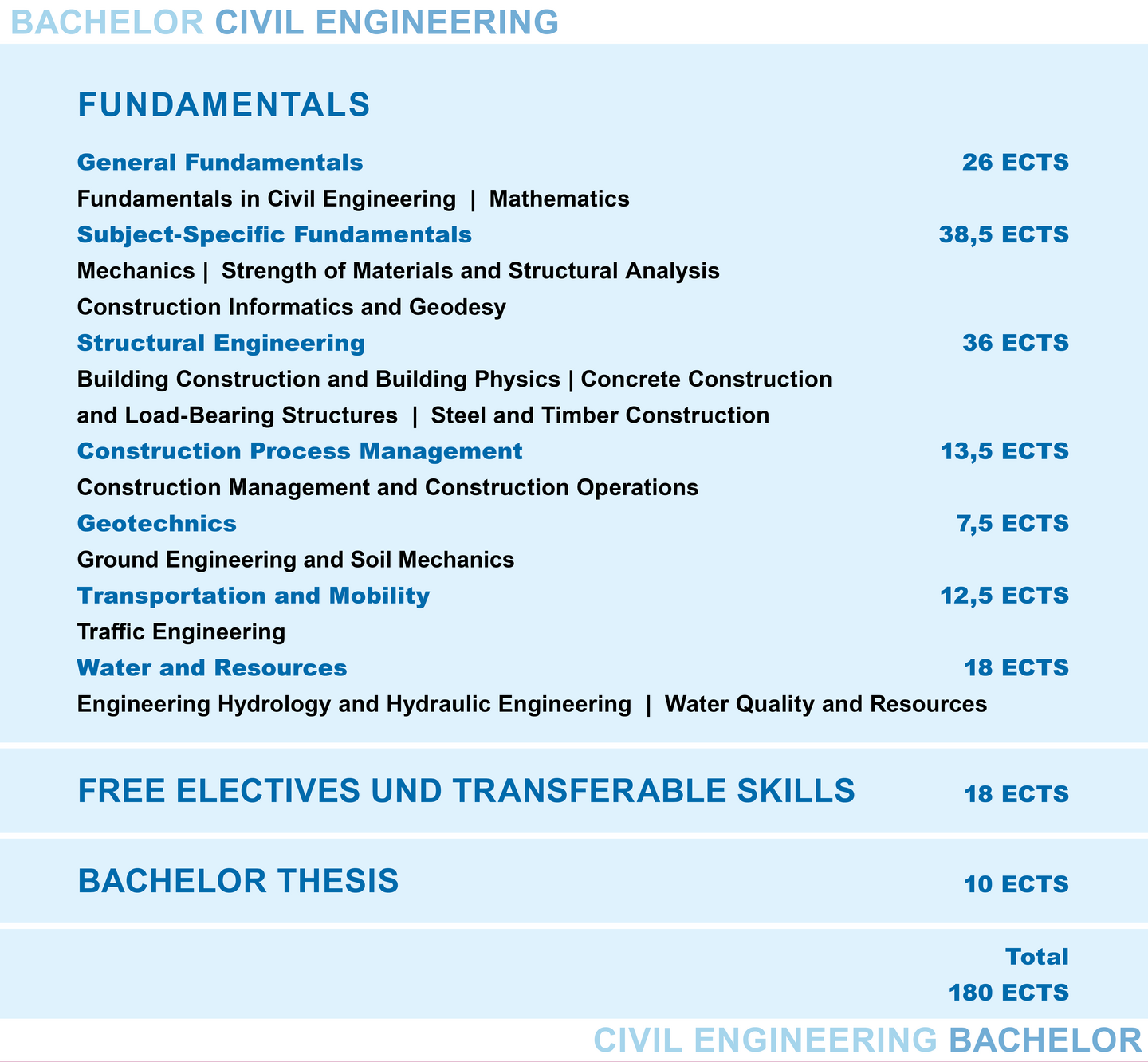Bachelor's Programme Civil Engineering
- Programme Code
-
UE 033 265 - Bachelor's Programme Civil Engineering
- Duration of Programme
-
6 semesters
- Credits
-
180 ECTS
- Language
-
German
- Degree
-
Bachelor of Science (BSc)
- Curriculum
Programme contents
In the Bachelor's Program Civil Engineering, you will receive a well-rounded education in all areas of civil engineering. You will learn how to design, plan and build and preserve our environment. You will check and calculate the feasibility of architects' designs and plans and work together with them and many other specialists.
Together, you will create various structures such as buildings, bridges, tunnels, roads, dams, sewage treatment plants, landfills, power plants, and infrastructure for drinking water and sewage disposal.
In addition to basic subjects such as mathematics, mechanics, structural analysis, hydrology, construction economics and construction project management, there is a special focus on the use of the right construction materials, sustainability, environmental and noise protection, as well as the economical use of energy and recycling management.
As a civil engineer, you can work in a variety of industries. These include engineering offices, construction companies, the building materials industry, public administration, and university and non-university research institutions.
Programme-PRe-Phase
There is no Admission Procedure for the Bachelor's Programme in Civil Engineering. Instead, before admission, you have to deal with the contents of the study program in the so-called study preparation and reflection phase.
After an online self-assessment, you will receive feedback on your level of knowledge in mathematics
You can find all information about the Programme-PRe-Phase in the Bachelor's Programme Civil Engineering on the page of the same name.
Further information about the programme
For the Bachelor's Programme Civil Engineering you need above all an interest in technology and science. It is important that you enjoy working with others in a team, seeking solutions to complex problems and working responsibly.
In addition to the formal requirements for admission, you must provide evidence of two years of descriptive geometry in your school education. If you do not have this education, you will have to take a corresponding additional examination until the completion of the Bachelor's Programme.
You must register online in the campus software TISS, opens an external URL in a new window to participate in the Programme-PRe-Phase.
The admission takes place in the admission office of the TU Wien.
If you have any questions about your programme, you can contact the Student Union, opens an external URL in a new window and the Dean's Office of the Faculty of Civil and Environmental Engineering, opens an external URL in a new window.
The contents of the Programme are divided into different modules. A module consists of individual courses or courses with related content. You must complete these in order to complete the module. Thematically similar modules are combined into examination subjects. These examination subjects appear on the degree certificate with the overall grade achieved upon completion of the programme.
The scope of courses and modules is expressed in ECTS points. One ECTS point represents 25 hours of work.

The Bachelor's Programme Civil Engineering is composed of the following examination subjects and modules.
The mandatory foundation modules are:
- General Fundamentals: Fundamentals in Civil Engineering, Mathematics
- Subject-Specific Fundamentals: Mechanics, Strength of Materials and Structural Analysis, Construction Informatics and Geodesy
- Structural Engineering: Structural Engineering and Building Physics, Concrete Construction and Load-Bearing Structures, Steel and Timber Construction
- Construction Process Management: Construction Management and Construction Operations
- Geotechnics: Ground Engineering and Soil Mechanics
- Transportation and Mobility: Traffic Engineering
- Water and Resources: Engineering Hydrology and Hydraulic Engineering, as well as Water Quality and Resources.
In addition, you must complete 18 ECTS from a catalog of Free Electives and Transferable Skills.
Finally, you have to write your Bachelor's thesis.
More detailed information can be found in the curriculum in TISS, opens an external URL in a new window.
The Bachelor's Programme consists mainly of courses that are compulsory and allows a small scope of freely selectable subjects. The emphasis is on a broad and well-founded education in all areas of civil engineering.
Civil engineers work on various structures such as buildings, bridges, tunnels, roads, dams, sewage treatment plants, landfills, power plants, and drinking water and wastewater supplies. Many issues play a central role: in addition to building physics and using the right construction materials, you will also learn to pay attention to sustainability, environmental and noise protection, and infrastructure management.
Construction, like many other industries, contributes to greenhouse gas emissions. That's why the programme focuses on energy consumption throughout the life cycle of structures. You will develop and evaluate sustainable solutions that have a lower energy footprint and contribute to what is known as the circular economy. This means that raw materials that are processed into building materials are also reused after the end of a structure's life cycle, thus requiring fewer raw materials and less energy in the future.
As a civil engineer, you have a varied job that often requires collaboration with many different professionals. In addition to designing buildings, bridges and roads, you also contribute to the sustainability and protection of our environment. This includes measures such as using environmentally friendly materials, reducing emissions and preventing natural disasters.
You can work in a variety of industries, including engineering firms, construction companies, the building materials industry, public administration, and university and non-university research institutions. This gives you the opportunity to develop your career in different directions and gain experience.
We conduct research on many different topics in civil engineering:
- We create models to better understand how buildings and bridges can be built and use them to develop new ideas for load-bearing structures that can make the structure stronger.
- We calculate how economical different construction methods are and study what impact they have on the environment.
- We research the development of "smart" building materials that can help make buildings stronger and more efficient.
- We test different materials and analyze how they perform and how they affect the environment.
- We explore how we can create more sustainable systems and resources for the construction industry.
- We analyze risks and develop solutions for water supply and reuse of materials.
TU Wien offers its students the opportunity to spend a semester abroad. The International Office can help and support you with the organization.
Internships are not mandatory in the programme but are possible: If you are working in a field relevant to the subject, we can credit you with a corresponding number of ECTS in the Free Electives module. Further information and the corresponding form can be found at https://bauwesen.tuwien.ac.at/english/education/civil-engineering/bachelor-civil-engineering, opens an external URL in a new window.
In the Bachelor's Programme Civil Engineering you will spend most of your time at the main building of TU Wien at Karlsplatz 13. However, there are also courses that take place at other locations such as the TU Wien Science Center at Arsenal.
The programme is supervised by the following institutes:
- Institute of Mechanics of Materials and Structures
- Institute of Material Technology, Building Physics, and Building Ecology
- Institute of Building- and Industrial Construction
- Institute of Structural Engineering
- Institute of Geotechnics
- Institute of Hydraulic Engineering and Water Resources Management
- Institute of Water Quality and Resource Management
- Institute of Transportation
- Institute of Construction Process and Construction Economics
After you have completed all required courses and your Bachelor's thesis has been evaluated, you can submit your degree.
As a graduate of the Bachelor's Programme Civil Engineering, you will be awarded the academic degree "Bachelor of Science" - BSc for short. To find out how to graduate, visit https://bauwesen.tuwien.ac.at/english/education/civil-engineering/bachelor-civil-engineering, opens an external URL in a new window.
At the TU Wien, after completing your Bachelor's Programme in Civil Engineering, you can enroll in the Master's Programme in Civil Engineering for specialization.

